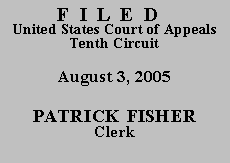

Appellant Matthew Penner was involved in an automobile accident in
McClain County, Oklahoma, in 1999. Following the accident, Mr. Penner and
his brother sued the Board of County Commissioners in state court. They alleged
McClain County workers failed to warn drivers adequately of construction in the
roadway. That action was dismissed without prejudice in April of 2000. Later
that year, the Penners sued the county again. Although the matter was set for
trial, the Penners, once again, voluntarily dismissed the action. They later tried
to reopen the case. That effort was unsuccessful as were their efforts to appeal to
the Oklahoma Court of Civil Appeals.
In the complaint underlying this § 1983 action, Mr. Penner alleged that the
county's lawyers (the individual defendants in this case) and the state trial judge
conspired with the county to deprive him of certain constitutional rights during
the state court proceedings. Defendants moved the district court to dismiss the
action for failure to state a claim alleging, inter alia, that Mr. Penner failed to
adequately allege that Defendants acted under color of state law. The district
court granted Defendants' motion holding that Mr. Penner produced no evidence,
or even sufficient allegations, that the individual lawyers and state court trial
judge conspired to deprive him of any federal constitutional rights. Upon receipt
of the district court's ruling, Mr. Penner filed a Rule 60(b) motion effectively
asking the court to reconsider its prior ruling. The district court denied the
motion. This appeal followed.
The legal sufficiency of a complaint is a question of law; therefore, a Rule
12(b)(6) dismissal is reviewed de novo. Sutton v. Utah State Sch. for Deaf
&
Blind, 173 F.3d 1226, 1236 (10th Cir. 1999). "The court's function on a Rule
12(b)(6) motion is not to weigh potential evidence that the parties might present
at trial, but to assess whether the plaintiff's complaint alone is legally sufficient
to state a claim for which relief may be granted." Id. (internal quotation
omitted).
Mr. Penner, because of the underlying nature of his suit, was subject to a
heightened pleading requirement:
When a plaintiff in a § 1983 action attempts to assert the necessary
"state action" by implicating state officials or judges in a conspiracy
with private defendants, mere conclusory allegations with no
supporting factual averments are insufficient; the pleadings must
specifically present facts tending to show agreement and concerted
action.
Sooner Products Co. v. McBride, 708 F.2d 510, 512 (10th Cir. 1983) (internal
citation omitted).
We have reviewed the parties' briefs, the relevant law, and the record on
appeal. In its November 1, 2004, Order, the district court correctly applied the
relevant law to the facts of this case. Indeed, we agree with the district court that
"[t]here are no allegations advanced by [Mr.] Penner that demonstrate a plan to
accomplish a common goal, preconceived and agreed upon by the alleged
conspirators." Aple. Br., Tab 5, at 4 (Dist. Ct. Order). For substantially the same
reasons as articulated by the district court in its well-reasoned November 1, 2004,
Order, dismissal of Mr. Penner's case was proper. In addition, for substantially
the same reasons as articulated by the district court in its December 1, 2004,
Order, we cannot say that the district court abused its discretion in denying Mr.
Penner's Rule 60(b) motion.(1) See
Adams v. Reliance Standard Life Ins. Co., 225
F.3d 1179, 1186 n.5 (10th Cir. 2000). Allowing Mr. Penner to amend would
have been an exercise in futility. Curley v. Perry, 246 F.3d 1278, 1281-82 (10th
Cir. 2001).
AFFIRMED.
Entered for the Court
Monroe G. McKay
Circuit Judge
*. This order and judgment is not binding
precedent, except under the
doctrines of law of the case, res judicata, and collateral estoppel. The court
generally disfavors the citation of orders and judgments; nevertheless, an order
and judgment may be cited under the terms and conditions of 10th Cir. R. 36.3.
1.We deny Mr. Penner's motion to disqualify
all the Tenth Circuit judges
for this appeal.
MATTHEW BUTCH PENNER, an
individual, and all others similarly
situated,
Plaintiff - Appellant,
v.
TOM CORDELL, an individual;
JEROMY E. BROWN; JOHN
BLODGETT, an individual; and
others similarly situated to Messrs.
Cordell and Brown,
Defendants - Appellees.
Before EBEL, McKAY, and HENRY,
Circuit Judges.
After examining the briefs and the
appellate record, this panel has
determined unanimously that oral argument would not materially assist the
determination of this appeal. See Fed. R. App. P. 34(a)(2); 10th Cir. R. 34.1(G).
The case is therefore ordered submitted without oral argument.
Click footnote number to return to corresponding location in the text.
![]() | Keyword |
Case |
Docket |
Date: Filed /
Added |
| Keyword |
Case |
Docket |
Date: Filed /
Added |
![]() (27014 bytes)
(27014 bytes)
![]() (17826 bytes)
(17826 bytes)
Comments to: WebMaster,
ca10 [at] washburnlaw.edu.
Updated: August 4, 2005.
HTML markup © 2005, Washburn University School of Law.
URL: http://ca10.washburnlaw.edu/cases/2005/08/05-6003.htm.